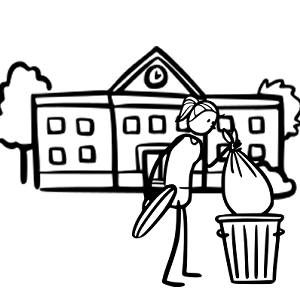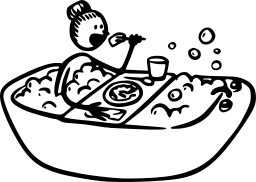Grammar Point:
Chinese indicates the existence of something in a particular place by adding the verb 在 zài. In this function, 在 zài can be translated as ‘be in’ or ‘be at’ in English.
Structure
S + 在 zài + location
我在家我在家
I am at home.
老師在美國老师在美国
The teacher is in the U.S.
圖書館在學校的3樓图书馆在学校的3楼
The library is located on the 3rd floor of the school.
📚 Some common location words you may need
S + 在 zài + location + do what
我在家聽音樂我在家听音乐
I listen to music at home.
老師在美國教中文老师在美国教中文
The Teacher teaches Chinese in the U.S.
我在廁所做蛋糕!我在卫生间做蛋糕!
I’m making cakes in the toilet!
(It means I am pooping.)
Negation
Both 不 bù and 没 méi are possible, but 不 bù is more about one’s subjective will, while 没 méi is an objective fact. It’s important to remember that in Chinese, talking about a fact usually implies the past tense, as the past cannot be changed. Therefore, if you’re asking about someone’s current location, it’s more appropriate to use 不 bù to negate it.
他不在公司他不在公司
He is not at the company.
他去年沒在中國學中文他去年没在中国学中文
He did not study Chinese in China last year.
哥哥不在電影院看電影哥哥不在电影院看电影
My older brother is not watching movies in the cinema.
哥哥沒在電影院看電影哥哥没在电影院看电影
My older brother did not watch movies in the cinema.
Question
There are 3 different ways we can turn it into a question.
Using 嗎/吗 ma
她在Apple上班嗎?她在Apple上班吗?
Does she work at Apple?
李大明常常在學校打人嗎?李大明常常在学校打人吗?
Does Daming Lee often beat people at school?
Using 哪 nǎ
她在哪上班?她在哪上班?
Where does she work?
你今天在哪吃飯?你今天在哪吃饭?
Where are you eating today?
Using 在不在 zàibúzài
她在不在Apple上班?她在不在Apple上班?
Does she work at Apple?
我先生在不在妳家?我先生在不在妳家?
Is my husband at your place?
Practice
TouchHover over the space to see the answers.

➡️
她在學校丟垃圾她在学校丢垃圾

➡️
他在便利商店喝咖啡他在便利商店喝咖啡

➡️
她在家裡跳舞她在家里跳舞

➡️
她在浴室吃飯她在浴室吃饭
- Actions in progress with 在 zài (HSK 1)
- Expressing locations with 在 zài (HSK 1)


